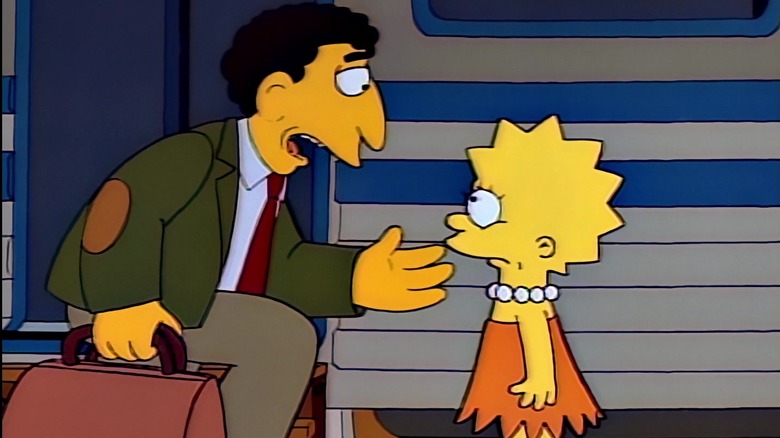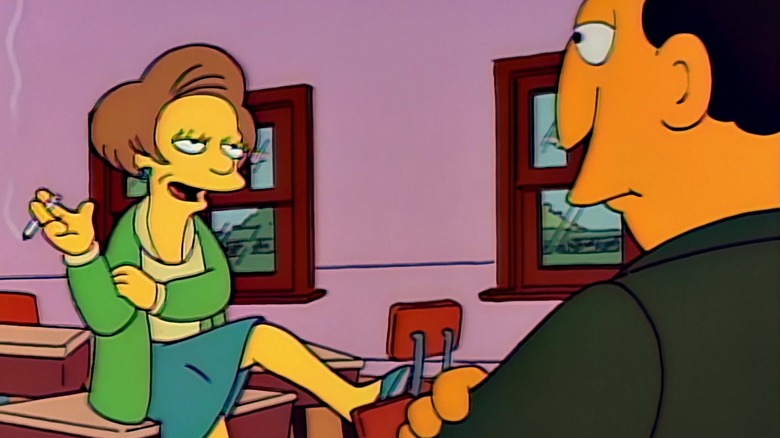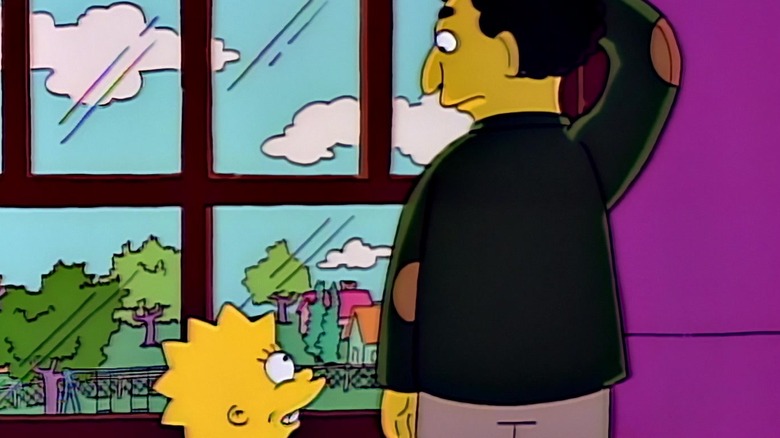An Early Episode Showed The Simpsons Crew What The Series Could Really Do
There's something special about "Lisa's Substitute," the 19th episode of the second season of "The Simpsons." First aired on April 25, 1991, the episode introduces Mr. Bergstrom, a smart and sensitive substitute teacher who wins Lisa's heart. Bergstrom is Lisa's first glimpse of the wider world outside of Springfield, a place where anything is possible. Yet by the end of the episode, Bergstrom has left the town and Lisa is heartbroken. Not even a hilarious B-plot where Bart tries and fails to be elected class president can numb the pain.
"Lisa's Substitute" was not the first episode of its kind. "The Way We Was" had mined Marge and Homer's high school romance for drama, laughs, and catharsis just a few months earlier. "Two Cars in Every Garage and Three Eyes on Every Fish" broke ground for political commentary that would fuel Bart's subplot in "Substitute." But "Lisa's Substitute" remains a defining "Simpsons" episode. It features a great early guest star in Dustin Hoffman. It deepens the character of Lisa, who would become a series stand-out. Most importantly, it finds a balance between humor and sentiment that cemented the show's legacy as a great television show as well as an anarchic joke machine. When modern viewers complain about the hollow insincerity of "Family Guy," you can be certain that the ghost of "Lisa's Substitute" is lurking in the corner of their minds.
Everyone backed out of it but me
The script for "Lisa's Substitute" is credited to Jon Vitti, who contributed to classic episodes like "Bart the Genius" and "Cape Feare." Yet according to the podcast "Talking Simpsons," Vitti denied credit for the episode in the DVD commentaries. The real force behind "Lisa's Substitute," Vitti claimed, was James L. Brooks. Brooks was an experienced film and television producer, co-creating the hugely influential sitcom "The Mary Tyler Moore Show" and directing the romantic comedy masterpiece "Broadcast News." It was Brooks who asked Matt Groening to pitch a series of shorts for "The Tracy Ullman Show" that would become "The Simpsons," and Brooks who worked as showrunner for the first two seasons of "The Simpsons" alongside Groening and the late Sam Simon.
Brooks was unusually hands-on with "Lisa's Substitute," writing not just a story treatment but specific lines of dialogue for the episode. Mr. Bergstrom's written message to Lisa, "You are Lisa Simpson," was written by Brooks. (For his part, Jon Vitti would lament that he missed the exclamation point in Brooks's original note.) The script for "Lisa's Substitute" was a tough assignment, and not just because it was an unusually dramatic episode in a series famous for its creative gags. The writer would not only have to do justice to the words of one of the most powerful people working on the show, but also to put those words in the mouth of a big guest star. "Everyone backed out of it but me," Vitti said.
Acting face to face
While "Lisa's Substitute" was a frustrating episode for Vitti to write, it was a triumph for other members of the crew. Director Rich Moore, who would later handle Vitti's script for "Cape Feare," tackled "Lisa's Substitute." A Ringer article would quote Vitti saying that "Rich's calling card was the perfection of his small touches...the facial acting in his episodes was always the best." "The Simpsons" is best known for its legendary writer's room, but episodes like "Lisa's Substitute" demanded deliberate framing and character acting. Moore's graceful handling of tricky emotional scenes further sets "The Simpsons" apart from its later comic progeny.
It's tough to imagine "Lisa's Substitute" without Dustin Hoffman, who starred in classics including "The Graduate" and "All The President's Men." James L. Brooks requested that Hoffman and Lisa's voice actor Yeardley Smith "get in the same room together, acting face-to-face, to record the scene." Smith would later say that she improved significantly as an actor through her collaboration with Hoffman. Future Lisa-centric episodes like "I Love Lisa" and "Lisa's Wedding" would see Smith and her character blossom even further into a reliable source of excellent stories. But while there is every reason to assume that Hoffman took the job seriously, he chose to be credited under a pseudonym rather than using his actual name. The idea of a live-action actor voicing a character in a TV cartoon was still seen as a potentially destructive career decision, even when that TV cartoon was on a hot streak.
You are Lisa Simpson
"Lisa's Substitute" occupies a fascinating place in the overall "Simpsons" oeuvre. At the time of its making, the show's writers were frustrated by the sentimentality Brooks demanded. They preferred brainstorming layered gags to writing serious scenes without the safety net of humor. Over time, the arc of "The Simpsons" would bend not towards "Lisa's Substitute," but towards experimentation ("22 Short Films About Springfield,") parody ("Treehouse of Horror") and inventing whole new genres of joke (the purposefully too long rake gag in "Cape Feare.") Today, in its late period, "The Simpsons" could never dream of evoking the same bittersweet feelings in its audience that "The Way We Was" or "Lisa's Substitute" did.
Nevertheless, "Lisa's Substitute" has a legacy. "Talking Simpsons" host Henry Gilbert would call it the most "remembered episode of season 2." Guest Emily St. James went further, saying that many of the show's best future moments were only possible "because they did 'Lisa's Substitute' back in 1991." "The Simpsons" made its name as a hilarious cartoon willing to say and do things once thought impossible on television. But once the show's staff accomplished the feat of making its audience laugh and cry in the very same episode, the sky was truly the limit. As Matt Groening would tell GQ, the release of "Lisa's Substitute" made them realize, "look what we can do." It was only the beginning.



